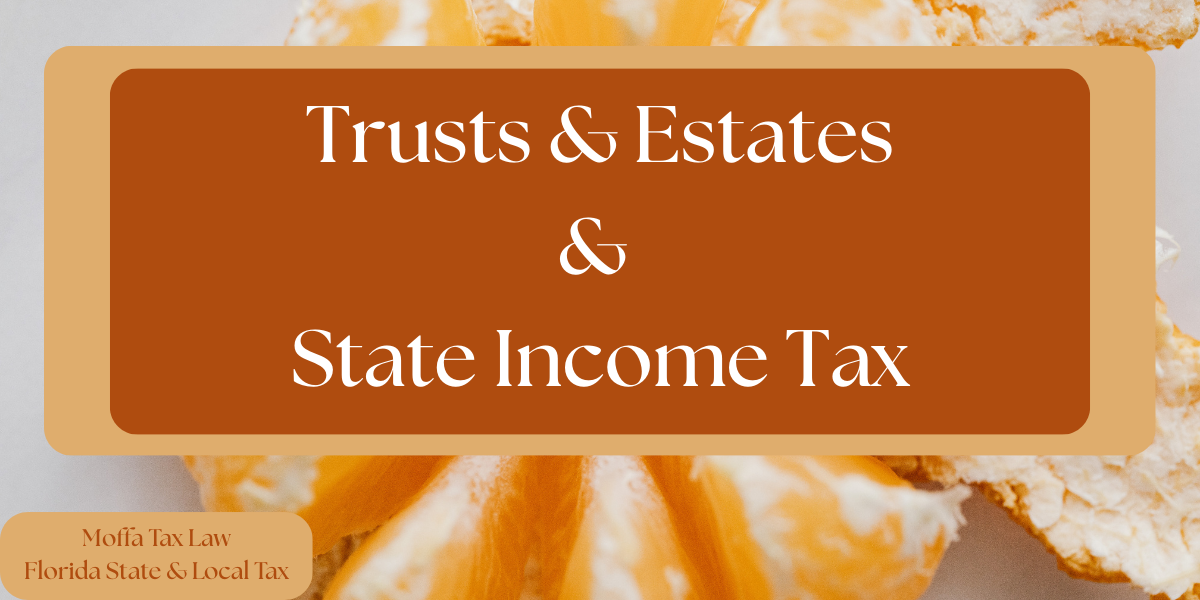NEWS & INSIGHTS


State Residency and Source Income Battles: Highlights from the May 2025 SALT Personal Income Tax Report
Residency disputes, source income complexities, and trust taxation are at the heart of personal income tax developments across the states. The ABA State and Local Tax Committee’s May 2025 Personal Income Tax and Trusts & Estates Subcommittee Report offers a state-by-state look at recent case law and guidance shaping the landscape.
🚨 Residency Under the Microscope
States are increasingly aggressive in asserting residency—and taxpayers are pushing back. In California, the Office of Tax Appeals continues to enforce physical presence and domicile factors with an eye toward remote work and temporary relocations. The Matter of Markowski (CA) highlighted the use of digital breadcrumbs in proving a taxpayer’s principal place of residence.
Meanwhile, Massachusetts issued guidance reinforcing that “statutory residency” can be triggered by maintaining a dwelling in the state and being present for more than 183 days, even when work is performed elsewhere. The case Welch v. Commissioner clarified how cross-border work-from-home arrangements are handled for residency audits.
📍 Sourcing of Income: A Growing Battlefield
States are clamping down on what they consider in-state sourced income—especially when taxpayers live or move out-of-state.
- In New York, the Matter of Lynch showed the state’s aggressive position on investment management and partnership income—even when structured through out-of-state entities.
- Ohio clarified that options exercised post-residency must still be sourced to the state if they accrued during in-state employment.
- South Carolina issued guidance on nonresident sourcing, underscoring that pension and deferred compensation are taxed where the work was performed—not where the taxpayer lives now.
🏠 Trusts & Estates: Small Changes, Big Impacts
Though fewer in volume, trust and estate cases are having a disproportionate impact:
- Montana enacted legislation affecting how non-grantor trusts are taxed based on the residency of trustees and beneficiaries.
- Washington issued regulations clarifying that the situs of a trust’s administration—not just the trustee’s location—can trigger state-level filing obligations.
- Maryland issued informal guidance suggesting that income retained in a trust is taxed even if not distributed to in-state beneficiaries.
🧾 What SALT Practitioners Should Watch For
As hybrid workforces and remote employees challenge traditional concepts of presence, expect more aggressive audits and closer scrutiny of statutory residency tests. Taxpayers with complex portfolios—especially those with K-1s or deferred compensation—should anticipate sourcing disputes, particularly if they’ve changed states in recent years.
Trust and estate planning also requires fresh attention. Taxation based on administration location, beneficiary residency, and evolving nexus rules may all impact filing obligations.
Bottom line: The personal income tax space is heating up, and staying ahead of these developments will be key for both taxpayers and advisors.
Moffa Tax Law | Florida State and Local Tax Attorneys
It’s typically triggered when a taxpayer maintains a home in a state and spends more than 183 days there, even if they claim to reside elsewhere.
California used digital records and lifestyle clues to challenge a taxpayer’s claimed move out of state.
Income is often sourced to the state where the services were performed, not necessarily where the taxpayer resides when it’s received.
It clarified that even when employees work remotely across state lines, Massachusetts can still assert residency based on time and home presence.
Ohio may tax stock options exercised post-residency if they were earned while the taxpayer worked in-state.
States vary—some look to the location of the trustee, others to the beneficiaries, and others to the administration location.
Yes. Washington may assert filing obligations based on where a trust is administered, even if the trustee is out-of-state.
Multi-state workers should document time and activities carefully to defend against residency or income sourcing audits.
They make it easier for states to allege dual residency or tax income from multiple jurisdictions.
Increased mobility, remote work, and changing trust rules make it harder to define “home” or “source,” sparking more audits and litigation.
Share
Additional Articles by the SALTy Orange at Moffa Tax Law:
State Residency and Source Income Battles: Highlights from the May 2025 SALT Personal Income Tax Report
NEWS & INSIGHTS State Residency and Source Income Battles: Highlights from the May 2025 SALT Personal Income Tax Report State…
NEWS & INSIGHTS States Compete With Tax Credits: A Deep Dive into May 2025 SALT Incentive Updates States Compete With…
NEWS & INSIGHTS Inside the FTA’s May 2025 Committee Report: What State Tax Officials Are Watching Inside the FTA’s May…

Jeanette Moffa, Esq.
(954) 800-4138
JeanetteMoffa@MoffaTaxLaw.com
Jeanette Moffa is a Partner in the Fort Lauderdale office of Moffa, Sutton, & Donnini. She focuses her practice in Florida state and local tax. Jeanette provides SALT planning and consulting as part of her practice, addressing issues such as nexus and taxability, including exemptions, inclusions, and exclusions of transactions from the tax base. In addition, she handles tax controversy, working with state and local agencies in resolution of assessment and refund cases. She also litigates state and local tax and administrative law issues.


